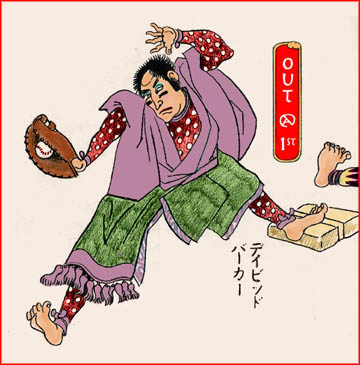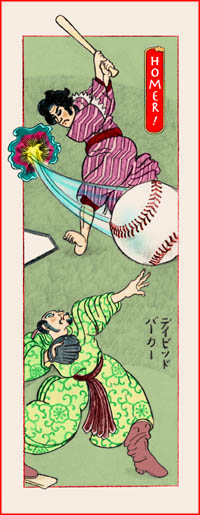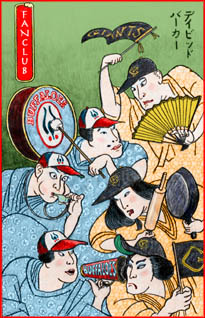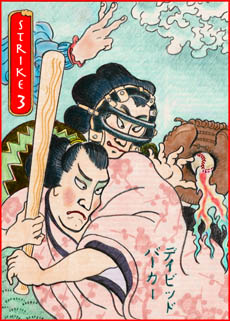This article originally appeared in the Sports Issue of Exploring Magazine.

by
David Barker
It has been said ironically that England and America are two countries separated
by a common language--English. It could just as easily be said that Japan
and the United States are similarly separated by a common sport--baseball.
Robert Whiting, in his book You Gotta Have Wa, believes that sport
can be a means to understanding subtle aspects of culture and national identity.
And when two countries share a common sport, the differences are often more
telling than the similarities.
Baseball was introduced to Japan at the start of the Meiji Period (1867-1912)
by Horace Wilson, a young American history and English teacher. As Japan struggled
to emerge from three centuries of feudal isolationism, Wilson taught his students
at Tokyo's Kaisei Gakko the rudiments of his country's national pastime.
The sport quickly caught the spirit of the Japanese people: by 1905, college
baseball was Japan's number one sport. Professional teams were instituted
in 1935, and now every year twenty million fans faithfully troop out to the
ballpark and cheer on the Yakult Swallows, the Taiyo Whales, the Nippon Ham
Fighters, and the Hiroshima Carp, among others. Japan has been baseball crazy
for over a hundred years.

As one Japanese writer put it, "Baseball is perfect for us. If the Americans
hadn't invented it, we would have." On the surface, Japanese baseball
(besuboru, or yakyu--field ball) is similar to its American counterpart. Nine
innings, nine players a side, and it's suree sutoraikku (three strikes) and
yer out at the old ball game. But look closer (and Robert Whiting did) and
you'll see differences that reveal how the game has been adapted to Japanese
culture.
Before the introduction of baseball, group sport didn't exist in Japan. Athletic
competition consisted of individual feats and one-on-one contests such as
Sumo wrestling, kendo (fencing), horseback riding, and swimming, all extensions
of military training. Since there was no equivalent word for "sport"
in the Japanese language, a new word was coined: supotsu.
Baseball expanded the notion of competition to include a vital aspect of Japanese
society: the importance of the group. Historically a clan- or family-based
society, Japan has always demanded that the individual subordinate him- or
herself to the group in order to maintain group harmony, or wa. Any
individual activity that interrupts the smooth flow of wa is dealt with instantly
and harshly. As the Japanese saying goes, "The nail that sticks up will
be hammered down."
American baseball thrives on the nails that stick up. The game has always
been defined by its heroes--the Babe Ruths, Christy Mathewsons, Joe DiMaggios,
and Willie Mayses. It is set up for the larger-than-life confrontation between
pitcher and batter, and how the team fares is almost secondary to the accomplishments
of its heroes.

Japanese baseball enjoys this mano-a-mano aspect of the game as well, harkening
as it does to the essential nature of samurai combat. But stars like Sadaharu
Oh (Japan's great home-run hitter and the closest thing they have to a superstar)
are exceptions to the rule. Team attitude is paramount, and as a result the
game becomes, by Western standards, a little, well...boring.
Besuboru is played as if nobody wants to be the one to make a mistake.
In America, the home run is king. The ultimate is the dramatic blast that
knocks in three runs and wins the game. In contrast, Japanese games are won
by bunts and walks. Pitchers throw a lot of curve balls and nibble at the
corners of the plate. Three-ball, two-strike counts are common in Japan, and
consequently there are a lot of walks. Nobody wants to be the one who serves
up the homu ran. In the U.S. of A., this pitching approach is considered somewhat
effete, and the prevailing mentality is more one of "C'mon, throw me
your best fastball, let's see what you got...." In the States, the players
are more apt to challenge one another physically, and this is known affectionately
as "country hardball."
Japanese are attracted to baseball because of its relatively slow pace. On-field
meetings are convened to consider every possible factor in detail before a
decision is made. Like a Japanese business meeting, the game can go on, seemingly,
forever. According to Warren Cromartie, an American playing in Japan, "Managers
in Japan are afraid to make quick decisions, because they are afraid of making
a mistake. They have to discuss everything to death with their coaches before
they make a move. I played one half-inning in Osaka that took forty-five minutes.
That must be a world record."
The Japanese attitude toward practice also reflects a different cultural approach.
Japanese teams are allowed a maximum of two Westerners (gaijin, or "outsiders,"
not necessarily a derogatory label). Most American ballplayers are literally
in for a rude awakening when they begin practice, Japanese style. Beginning
at dawn and continuing till dark, workouts resemble a Marine Corps drill instructor's
most sadistic fantasy of Boot Camp Hell. Commonly referred to as death or
gattsu (guts) drills, these exercises in marathon running, fielding (a thousand
ground balls in succession), and batting allow the player to demonstrate effort
(doryoku) and fighting spirit.
These highly prized attributes are an extension of the samurai concept of
bushido, the way of the warrior. This work ethic is reflected in all aspects
of society: each and every sarariman (salaryman--worker) is expected to have
it. The Japanese don't play baseball, they work it.
American ballplayers consider this approach foolhardy. Practicing while tired
is thought to produce bad habits and increase the risk of injury. They go
out to the field, stretch, warm up for forty-five minutes, knock the ball
around for a while and then go out and have a few beers with the guys. To
them, baseball is not designed to test one's loyalty, self-control, moral
discipline, and selflessness. What Westerners call a pastime becomes, in the
hands of the Japanese, a rigorous spiritual form. Needless to say, most gaijin
ballplayers in Japan don't last long.

I recently attended a ballgame outside of Osaka. Initially, my attention was
drawn to the fans. In the more expensive box seats, people were seated quietly,
watched the goings-on in the field with the same detachment and reserve typical
of Japanese social demeanor. But in the cheap seats along the first- and third-base
lines, a different atmosphere prevailed. Five or six oendan, or fan clubs,
were cheering on the hometown Kintetsu Buffaloes. Each group was trying to
outdo the others. Huge banners were being waved, and the aisles were clogged
with rows of bright happi-coated cheerleaders with samurai headbands and megaphones.
They were exhorting the fans to yell and chant together, and to drum their
plastic megaphones in a never-ending rhythm. The whole stadium pulsed with
energy.
In many Japanese stadiums, fans spur their team on with whistles, gongs, taiko
drums, even frying pans. The fervor and cumulative sound is not to be believed.
One New York television producer described a long afternoon spent in the middle
of a Yomiuri Giants' oendan: "These people are lunatics! There's more
noise here than the World Series and the Army-Navy game combined. How do they
keep it up?"
The fan clubs point out another function of baseball in Japanese society.
The average sarariman works hard, and is expected to hide his true feelings
and desires during the business day in deference to the company. And when
alone or in a small group, this attitude continues (as in the case of the
small, quiet groups of fans). But the oendan is a perfect escape valve for
the internalized emotions and pressures of daily life. There is nothing better
than to get together with other like-minded fanatics and sing, say, the Tokyo
Giants' fight song at the top of ones' collective lungs:
To the sky with fighting soul,
The ball soars and soars with burning flames.
Aah...Giants.
Ever proud of the name
Their courage lights up the field.
Giants...Giants...
Go...Go...Giants Troop.
Like literature, art, music, and theater, sport can reveal a lot about a nation's
cultural identity.
Jacques Barzun once said, "Whoever wants to know the heart and mind of
America had better learn baseball." And Suishu Tobitsa sums it up pretty
good, too: "Baseball is more than just a game. It has eternal value.
Through it one learns the beautiful and noble spirit of Japan."

